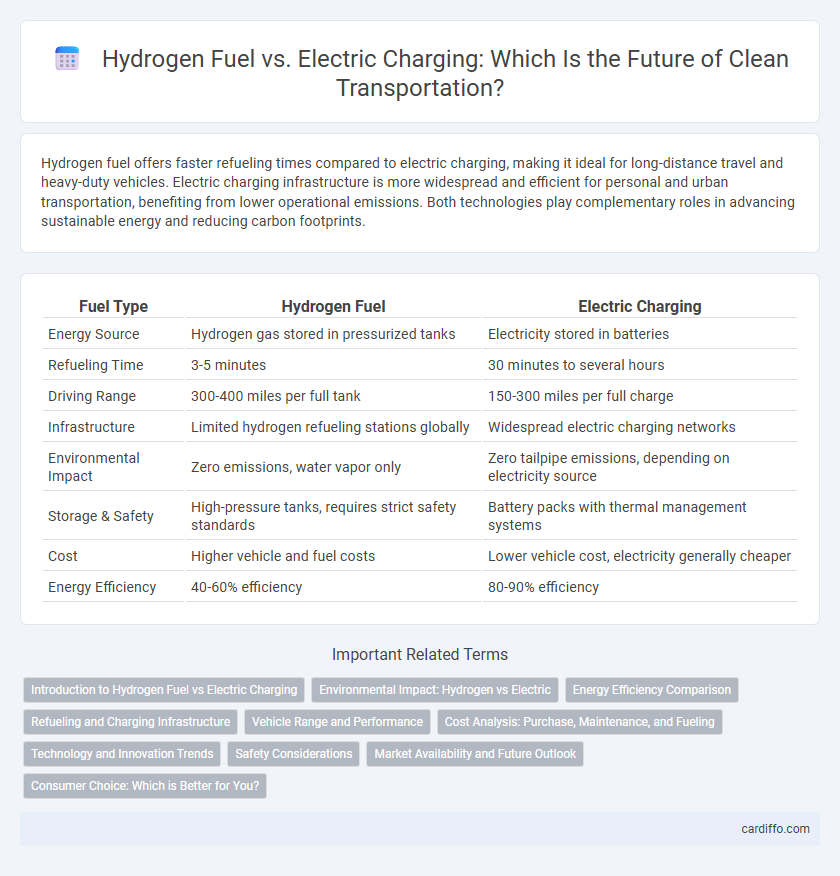Hydrogen fuel offers faster refueling times compared to electric charging, making it ideal for long-distance travel and heavy-duty vehicles. Electric charging infrastructure is more widespread and efficient for personal and urban transportation, benefiting from lower operational emissions. Both technologies play complementary roles in advancing sustainable energy and reducing carbon footprints.
Table of Comparison
| Fuel Type | Hydrogen Fuel | Electric Charging |
|---|---|---|
| Energy Source | Hydrogen gas stored in pressurized tanks | Electricity stored in batteries |
| Refueling Time | 3-5 minutes | 30 minutes to several hours |
| Driving Range | 300-400 miles per full tank | 150-300 miles per full charge |
| Infrastructure | Limited hydrogen refueling stations globally | Widespread electric charging networks |
| Environmental Impact | Zero emissions, water vapor only | Zero tailpipe emissions, depending on electricity source |
| Storage & Safety | High-pressure tanks, requires strict safety standards | Battery packs with thermal management systems |
| Cost | Higher vehicle and fuel costs | Lower vehicle cost, electricity generally cheaper |
| Energy Efficiency | 40-60% efficiency | 80-90% efficiency |
Introduction to Hydrogen Fuel vs Electric Charging
Hydrogen fuel offers rapid refueling times and high energy density, making it an efficient option for long-distance transportation compared to electric charging, which often requires extended periods to recharge battery packs. Electric charging infrastructure is more widespread and benefits from the expanding grid of renewable energy sources, while hydrogen fuel depends on the development of fueling stations and advanced storage technologies. Both hydrogen fuel cells and battery electric vehicles contribute to reducing carbon emissions, but their adoption depends on factors like cost, infrastructure availability, and energy efficiency.
Environmental Impact: Hydrogen vs Electric
Hydrogen fuel generates water vapor as its only emission, significantly reducing greenhouse gases compared to fossil fuels, but its production often relies on natural gas, leading to CO2 emissions unless green hydrogen methods are used. Electric charging emits zero tailpipe emissions and can achieve near-zero overall emissions when powered by renewable energy sources like solar or wind. Lifecycle analyses indicate that electric vehicles typically have a lower environmental footprint than hydrogen fuel cell vehicles, primarily due to the energy-intensive hydrogen production and infrastructure challenges.
Energy Efficiency Comparison
Hydrogen fuel cells convert chemical energy into electricity with an efficiency of around 60%, while electric vehicle (EV) batteries achieve energy conversion efficiencies of 85-90%, making electric charging more energy-efficient overall. Producing, compressing, and transporting hydrogen involves significant energy losses, reducing the well-to-wheel efficiency to approximately 30-40%. In contrast, electric vehicles charged from the grid typically maintain higher well-to-wheel efficiency, especially when powered by renewable energy sources, enhancing their energy efficiency advantage over hydrogen fuel.
Refueling and Charging Infrastructure
Hydrogen fuel refueling stations provide an average refill time of 3-5 minutes, significantly faster than the typical 30-60 minutes required for electric vehicle (EV) charging at Level 2 stations. However, hydrogen infrastructure remains limited, with fewer than 500 public hydrogen stations globally, primarily concentrated in regions like California, Japan, and Germany. In contrast, electric charging networks have expanded rapidly, boasting over 1.5 million public chargers worldwide, including fast chargers that reduce charging times to under 30 minutes.
Vehicle Range and Performance
Hydrogen fuel vehicles typically offer longer driving ranges, often exceeding 300 miles per tank, compared to electric vehicles which average around 250 miles per charge. Hydrogen fuel cells provide faster refueling times, usually under 5 minutes, significantly outperforming electric charging stations that can take from 30 minutes to several hours. Performance-wise, hydrogen vehicles deliver consistent power output even in extreme temperatures, while electric vehicle range and efficiency can decrease in cold weather conditions.
Cost Analysis: Purchase, Maintenance, and Fueling
Hydrogen fuel vehicles typically have higher upfront costs compared to electric vehicles, with fuel cell technology and specialized storage systems driving prices upward. Maintenance for hydrogen vehicles can be more expensive due to complex fuel cell systems, whereas electric vehicles benefit from fewer moving parts and lower servicing expenses. Fueling costs for hydrogen remain higher per mile due to limited infrastructure and production expenses, while electric charging leverages expanding grid access and lower electricity prices.
Technology and Innovation Trends
Hydrogen fuel technology advances with innovations in electrolysis and fuel cell efficiency, enabling faster refueling and higher energy density compared to traditional batteries. Electric charging technology improves through ultra-fast chargers and solid-state batteries, enhancing energy storage and reducing charging times significantly. Emerging trends highlight integration of smart grids and renewable energy sources, optimizing both hydrogen production and electric charging infrastructures for sustainable transportation.
Safety Considerations
Hydrogen fuel systems require rigorous safety protocols due to hydrogen's high flammability and low ignition energy, necessitating robust leak detection and ventilation in refueling stations. Electric charging poses risks primarily related to electrical faults, overheating, and battery thermal runaway, prompting the need for advanced battery management systems and safe charging infrastructure. Careful design and stringent safety standards are essential for both technologies to mitigate potential hazards and ensure user and environmental protection.
Market Availability and Future Outlook
Hydrogen fuel stations remain limited in number, concentrated largely in regions like California, Japan, and parts of Europe, while electric charging infrastructure continues to expand rapidly worldwide with over 1 million public chargers. Market forecasts predict hydrogen fuel cell vehicles will gain traction primarily in heavy transport and industrial sectors by 2030, complementing the electric vehicle market dominated by passenger cars. Investments in hydrogen production technology and scaling of electrolyzers aim to reduce costs, positioning hydrogen as a key player in decarbonizing transportation alongside widespread electric vehicle adoption.
Consumer Choice: Which is Better for You?
Hydrogen fuel offers rapid refueling times and longer driving ranges, making it ideal for consumers prioritizing convenience and long-distance travel. Electric charging provides widespread infrastructure and lower operational costs, appealing to users focused on affordability and environmental impact. Evaluating your driving habits and access to refueling or charging stations will determine the best choice between hydrogen fuel and electric charging for your needs.
hydrogen fuel vs electric charging Infographic

 cardiffo.com
cardiffo.com